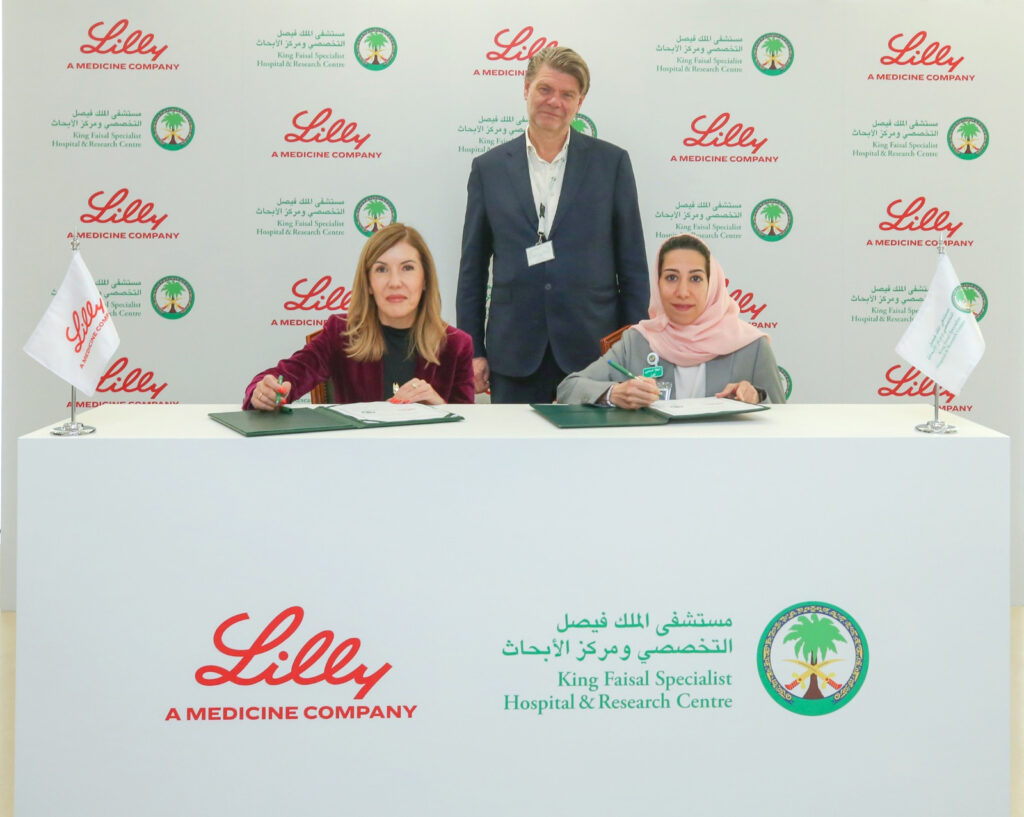Lilly Collaborates With Top Saudi Hospital On Manufacturing Alzheimer’s Early Detection Tests
The signing of a Memorandum of Understanding (MoU) between King Faisal Specialist Hospital & Research Centre (KFSHRC) and Eli Lilly Saudi Arabia Limited (Lilly) would pave the way to transform KFSHRC’s Neuroscience Centre into a regional hub of excellence for Alzheimer’s Disease.
King Faisal Specialist Hospital & Research Centre (KFSHRC) and Eli Lilly Saudi Arabia signed a landmark MoU aimed to improve Alzheimer’s patient care.
The Parties aim to jointly explore initiatives to educate and train Saudi Arabian healthcare professionals about neurodegenerative diseases such as Alzheimer’s, including the latest global research findings and best-in-class global practices in care.
This comprehensive collaboration envisages, among others, Lilly transferring certain manufacturing know-how to KFSHRC to enable future manufacturing of Positron Emission Tomography (PET) imaging agents and tracers in Saudi Arabia, with export potential.
PET scans are advanced imaging tests utilizing radiopharmaceuticals called tracers. Organs or tissues absorb these tracers and specifically accumulate in areas where the tracer target is present. PET scans are frequently used to detect early signs of cancer, heart disease, and brain conditions. Thus, they help in diagnosing and assessing the spread of cancer, heart problems, and brain disorders such as tumours, epilepsy, dementia, and Alzheimer’s disease.
Dr. Najeeb Qadi, Director of the Neuroscience Centre at KFSHRC, said: “The signing of this MoU between KFSHRC & Lilly represents a transformative step in our fight against Alzheimer’s disease. Through localised, cutting-edge PET imaging technology, we can empower earlier, more accurate diagnoses, potentially giving patients a chance at better outcomes and improved quality of life. A key aspect of this contemplated collaboration is the transfer of knowledge and technology, which could ensure that Saudi specialists are equipped with the latest advancements. This initiative would empower our local experts to deliver world-class care, bringing global innovations directly to our patients. This collaboration reinforces our unwavering commitment to the well-being of our patients and their families. Together, we are not just advancing care; we are giving hope to a new home.”
In Riyadh, Irina Zaporozhets, President of Lilly Middle East and Turkey, said: “Lilly hopes to bring state-of-the-art early detection processes for diseases like Alzheimer’s to Saudi Arabia. By combining our expertise with KFSHRC, we aim to make transformative strides in diagnosing and treating Alzheimer’s in Saudi Arabia”. This long-term strategic collaboration could potentially allow the production of Amyloid and Tau PET tracers in Saudi Arabia at KFSHRC for Alzheimer’s PET imaging. It holds the potential to improve patient outcomes and establish a foundation for ongoing regional Alzheimer’s research and innovation.”
It is noteworthy that KFSHRC has been ranked first in the Middle East and Africa and 20th globally in the list of the world’s top 250 Academic Medical Centres for the second consecutive year and has been recognised as the most valuable healthcare brand in the Kingdom and the Middle East, according to the 2024 Brand Finance rankings. Additionally, in the same year, it was ranked among the world’s best 250 hospitals and included in the World’s Best Smart Hospitals list for 2025 by Newsweek magazine. For more information, visit www.kfshrc.edu.sa or contact our media team at mediacoverage@kfshrc.edu.sa







 Email: info@cyber-gear.com
Email: info@cyber-gear.com